A completely unnecessary war has started, born out of one man’s nostalgia, paranoia and fear of losing power, Anne Applebaum tweeted.
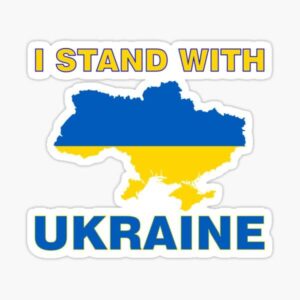 Like the Russian czars before him—like Stalin, like Lenin—Putin perceives Ukrainianness as a threat, says Applebaum, the author of Twilight of Democracy: The Seductive Lure of Authoritarianism. Not a military threat, but an ideological threat, she writes for The Atlantic:
Like the Russian czars before him—like Stalin, like Lenin—Putin perceives Ukrainianness as a threat, says Applebaum, the author of Twilight of Democracy: The Seductive Lure of Authoritarianism. Not a military threat, but an ideological threat, she writes for The Atlantic:
Ukraine’s determination to become a democracy is a genuine challenge to Putin’s nostalgic, imperial political project: the creation of an autocratic kleptocracy, in which he is all-powerful, within something approximating the old Soviet empire. Ukraine undermines this project just by existing as an independent state. By striving for something better, for freedom and prosperity, Ukraine becomes a dangerous rival.
For if Ukraine were to succeed in its decades-long push for democracy, the rule of law, and European integration, then Russians might ask: Why not us? adds Applebaum, a board member of the National Endowment for Democracy (NED).
 Putin’s actions show that he’s as much of an aggressive dictator abroad as he is a despot at home, said Daniel Fried, a former assistant secretary of state for Europe. It is now up to the US to organize the democratic community – what we used to call the Free World – in a coordinated response, he tells NPR’s Rachel Martin.
Putin’s actions show that he’s as much of an aggressive dictator abroad as he is a despot at home, said Daniel Fried, a former assistant secretary of state for Europe. It is now up to the US to organize the democratic community – what we used to call the Free World – in a coordinated response, he tells NPR’s Rachel Martin.
‘More isolated than Stalin’
The political scientist Gleb O. Pavlovsky, a close adviser to Mr. Putin until falling out with him in 2011, said he was stunned by the president’s dark description of Ukraine as a dire threat to Russia in his hourlong speech to the nation on Monday, The New York Times reports.
“I have no clue where he got all that — he seems to be reading something totally strange,” Mr. Pavlovsky said. “He’s become an isolated man, more isolated than Stalin was.”
The invasion has profound implications for geopolitical stability in eastern Europe, said Orysia Lutsevych (above), manager of the Ukraine Forum at Chatham House.
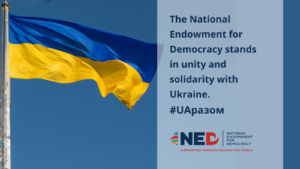 “Putin fears the agency of Ukrainian citizens to determine their own future and the example that sets for Russia,” said NED President and Chief Executive Officer Damon Wilson. “This crisis has profound consequences for the cause of freedom and democracy. Now is the time for free people around the world to rally in support of a free Ukraine.”
“Putin fears the agency of Ukrainian citizens to determine their own future and the example that sets for Russia,” said NED President and Chief Executive Officer Damon Wilson. “This crisis has profound consequences for the cause of freedom and democracy. Now is the time for free people around the world to rally in support of a free Ukraine.”
His actions over the past two decades have been geared toward reassembling as much of the former USSR as possible, and pushing NATO back not just from Ukraine and Georgia but the whole of Eastern Europe, note Francis Fukuyama and Jeffrey Gedmin (below). He wants, in other words, to reverse the democratic gains that followed on the fall of the Berlin Wall. We cannot let this happen, they write for American Purpose.
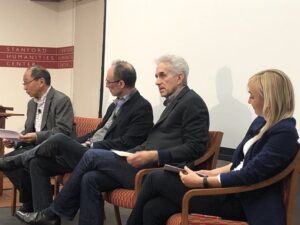 Traditional and social media with the potential to reach Russian journalists and civil society should counter the Kremlin’s narrative. And images of what is taking place inside Ukraine should reach the world, leaving no doubt about the toll in innocent lives caused by Mr. Putin’s adventurism, adds Richard N. Haass, the president of the Council on Foreign Relations.
Traditional and social media with the potential to reach Russian journalists and civil society should counter the Kremlin’s narrative. And images of what is taking place inside Ukraine should reach the world, leaving no doubt about the toll in innocent lives caused by Mr. Putin’s adventurism, adds Richard N. Haass, the president of the Council on Foreign Relations.
Intervening countries tend to underestimate the difficulty of prevailing or of translating battlefield successes into lasting gains, he writes for The New York Times. Gradually, those at home tend to grow weary of shouldering the mounting costs tied to the pursuit of elusive objectives. The Soviet Union’s invasion of Afghanistan, which began in 1979, dragged on for a decade and badly damaged the state’s authority, is a case in point.
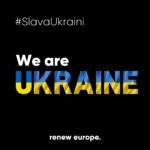 Putin is likely to use the war he has unleashed as an excuse to wipe out the last vestiges of political freedom in Russia, according to FT analyst Gideon Rachman. The country will now tilt into full-scale dictatorship, which will make it easier to stamp out any dissent from Russians dismayed by the course that Putin has chosen.
Putin is likely to use the war he has unleashed as an excuse to wipe out the last vestiges of political freedom in Russia, according to FT analyst Gideon Rachman. The country will now tilt into full-scale dictatorship, which will make it easier to stamp out any dissent from Russians dismayed by the course that Putin has chosen.
On the other hand……
Putin is planting a bomb under the Russian state, according to Tatiana Stanovaya, founder and head of R.Politik, a political analysis firm. The invasion will have significant ramifications for Russian society. The whole system is switching from the “power of authority”, based on popular legitimacy, to the “authority of power” — reliance on repression rather than constructive strategy, she writes for The FT:
Putin will have to stay in power for as long as physically possible, and he will have to rely more and more on security officials, who are the most hawkish and conservative part of the elite. As time passes, public discontent and anger will gradually accumulate. By dismantling mechanisms for society to blow off steam and tightening political conditions, Putin is planting a bomb under the Russian state. Inevitably, it will explode with great violence, causing massive destruction when the regime begins to fall apart.
Victory of a Defeat?
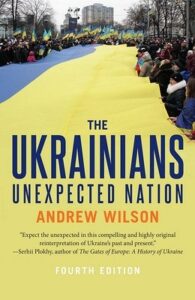 In the early fog of a war that is just beginning, there are four things Europe and the rest of the west need to do, historian Timothy Garton Ash writes for The Guardian:
In the early fog of a war that is just beginning, there are four things Europe and the rest of the west need to do, historian Timothy Garton Ash writes for The Guardian:
- First, we need to secure the defense of every inch of NATO territory, especially at its eastern frontiers with Russia, Belarus and Ukraine, against all possible forms of attack, including cyber and hybrid ones….
- Second, we have to offer all the support that we can to the Ukrainians, short of breaching the threshold that would bring the west into a direct war with Russia…… We can continue to supply weapons, communications and other equipment to those who are entirely legitimately resisting armed force with armed force. As important in the medium term, we can help those who will be using the well-tried techniques of civil resistance against a Russian occupation and any attempt to impose a puppet government. We must also stand ready to assist the many Ukrainians who will flee westward.
- Third, the sanctions we impose on Russia should go beyond what has already been prepared. …In the end, it will have to be the Russians themselves who turn round and say: “Enough. Not in our name.” Many of them, including the Nobel prizewinner Dmitry Muratov, already express their horror at this war…..
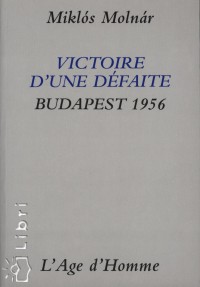 That brings me to a final, vital point: we must be prepared for a long struggle. It will take years, probably decades, for all the consequences of 24 February to be played out. In the short term, the prospects for Ukraine are desperately bleak. But I think at this moment of the wonderful title of a book about the Hungarian revolution of 1956: Victory of a Defeat. ….
That brings me to a final, vital point: we must be prepared for a long struggle. It will take years, probably decades, for all the consequences of 24 February to be played out. In the short term, the prospects for Ukraine are desperately bleak. But I think at this moment of the wonderful title of a book about the Hungarian revolution of 1956: Victory of a Defeat. ….
Almost everyone in the west has now woken up to the fact that Ukraine is a European country being attacked and dismembered by a dictator, adds Garton Ash. We had forgotten, in the years of our post-cold war illusions, that this is how nations write themselves on to the mental map of Europe: in blood, sweat and tears.
One Russia expert said that the invasion of a nation that is larger than France or Germany could eventually create an unsustainable situation for the Russians and was an enormous gamble, CNN reports.
“Putin is going to try to swallow a porcupine here and it is going to be hard for the Russian bear to digest it,” Paul Kolbe told CNN’s Erin Burnett. “This is a conflict that is going to extend over months and years whether the invasion goes well for Putin or not. He is going to change the shape of Europe and is going to set enduring lines of conflict within Ukraine and on the borders of Ukraine with the West,” he added.
“This is a globally systemic event. Putin is redrawing an Iron Curtain across emerging Europe,” Timothy Ash, emerging markets strategist at BlueBay Asset Management, told CNBC. “We have to totally take a fresh look at how we look at European and Western security, the role of Russian oligarchs, Russian business, and Russia Inc. in Western markets.”
A full-scale invasion would force Russia to move into areas that are bitterly hostile toward it. That increases the likelihood of a prolonged resistance (possibly even one backed by the US) — and an invasion could turn into an occupation, VOX reports.
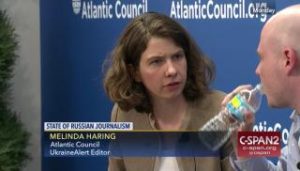
C-Span
“The sad reality is that Russia could take as much of Ukraine as it wants, but it can’t hold it,” said former NED Penn Kemble fellow Melinda Haring, deputy director of the Atlantic Council’s Eurasia Center.
The fate of the democratic west is being decided in Ukraine, says Journal of Democracy contributor Taras Kuzio. If the west allows Ukraine to be occupied and transformed into a Russian satellite state resembling Belarus it would be the beginning of the end for NATO and the EU. The west should undertake 10 steps, he writes for The Independent:
- First, the UK and its western allies should designate Russia as a terrorist state….
- Second, sanctions should be expanded to the level of those imposed on Iran…
- Third, the UK should close London as a laundromat for dirty Russian money. It is time to rename Londongrad….
- Fourth, warn the Kremlin against undertaking massive human rights abuses during a Russian occupation and that Putin and his Kremlin sycophants will be charged as war criminals by the International Criminal Court….
- Fifth, adopt a European-wide Magnitsky Act.. ….READ THE REST.
Michael McFaul, former U.S. ambassador to Russia, said that Russia’s attack on Ukraine was akin to Sept. 1, 1939, when Germany invaded Poland, starting World War II.
“This is a tragic day,” he told MSNBC. “This was an unprovoked attack of a democratic country.” It is likely a “tuning point” for Putin’s attempt to rebuild the Soviet empire, he added.
McFaul, a former NED Reagan-Fascell fellow, absolutely destroyed a BBC anchor on air for interviewing a Russian official who he said spewed “ridiculous” propaganda about the invasion and asked if the BBC would have given Nazis airtime during World War II.
 Putin may not escalate much further in Ukraine, but that’s because the West had called his bluff by refusing to grant any major security concessions, said Council on Foreign Relations expert Stephen Sestanovich (right), a former NED board member.
Putin may not escalate much further in Ukraine, but that’s because the West had called his bluff by refusing to grant any major security concessions, said Council on Foreign Relations expert Stephen Sestanovich (right), a former NED board member.
“Putin’s focus is less the European security order and more a kind of obsession with Ukraine as an illegitimate state that makes it almost impossible to imagine serious negotiations,” he added.
It’s time to go after the Kremlin’s dark money kleptocrats who actively threaten both Western integrity and security, adds Doug Klain, an Assistant Director at the Atlantic Council’s Eurasia Center. Democratic societies should be attractive around the world for a variety of reasons, but being easy marks for money laundering shouldn’t be one of them.
For years, anti-kleptocracy experts like US Helsinki Commission adviser and former Penn Kemble fellow Paul Massaro have been calling for Western leaders to crack down. “Purging blood money and blocking oligarchs from our systems protects us from their malign influence,” he told Klain.
Putin’s twisted historical narrative is blatantly wrong to claim that Ukraine has no independent identity separate from Russia. At the end of World War I, Ukraine declared independence from Russia and its subjugation was only restored by Soviet military force, a leading historian of Eastern Europe observes.
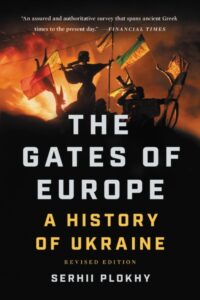 “Putin is no historian,” Yale University’s Timothy Snyder writes in The Financial Times. “Ukraine has its own distinct and fascinating history and Ukrainians have as much a right to a future as anyone else.”
“Putin is no historian,” Yale University’s Timothy Snyder writes in The Financial Times. “Ukraine has its own distinct and fascinating history and Ukrainians have as much a right to a future as anyone else.”
But Putin is right to say that Ukraine has a common history with Russia, adds philosopher-activist Bernard-Henri Lévy. But, remember this: It was a colonization. And then, under the Bolsheviks, the strategy of the “iron sweep” to rid Odessa of its anarchists. Then, with Stalin, the Holodomor, the extermination by hunger, that made at least 4 million victims, he writes for The Tablet.
No full Anschluss
Kadri Liik, a senior policy fellow at the European Council on Foreign Relations, claimed that Putin’s revanchist nationalism was at odds with the Russian public.
“A real large-scale war for Ukraine would be hugely unpopular,” she said. It “would be the beginning of the end of Putin’s rule, and I think he might know that.”
Which is probably why…….
The Russian President’s most likely strategy is a blitzkrieg designed to inflict maximum damage on Ukraine’s armed forces and other military assets, followed by a regime change that replaces Zelenskyy with someone more in the style of Viktor Yanukovych, the corrupt satrap overthrown exactly eight years ago in the ‘Euromaidan’ revolution, argues Niall Ferguson.
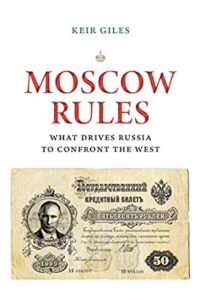 On 21 February, Putin went out of his way to correct a member of his national security council who used the word ‘annexation’, he writes for The Spectator:
On 21 February, Putin went out of his way to correct a member of his national security council who used the word ‘annexation’, he writes for The Spectator:
He may contemplate partitioning Ukraine but I don’t foresee full Anschluss. His goal seems to be to kill off once and for all Ukraine’s aspirations to become like Poland: not merely a member of NATO and the EU, but also a prosperous democracy oriented towards the West. He can achieve that by turning Ukraine into ‘Belarus South’ — a country where, rather like Russia, things changed after 1991 only in order to remain fundamentally the same.
Russia prosecutes counterinsurgency campaigns and suppresses resistance with medieval viciousness because it knows this is effective, adds Chatham House Russia expert Keir Giles, the author of Moscow Rules: What Drives Russia to Confront the West. There is no reason to think the terrorizing of civilian populations seen in Chechnya and Syria would not also be visited on the people of Ukraine, he writes for The Guardian:
Putin said that he had the names of supposed anti-Russian elements in Odessa, who would be found and punished. Which was chillingly close to a recent US disclosure that Russia had drawn up a list of individuals in Ukraine to be rounded up or eliminated. This too is precisely in line with Moscow’s past practice in Poland, the Baltic states and all the other European territories it occupied in the last century.
International Republican Institute polling shows strong majorities in Ukraine want to associate with the EU, not Russia, and to join NATO, IRI’s Daniel Twining notes. Ukrainians have never voted for closer association with Moscow—every time they have been free to choose, they have doubled down on sovereignty and democracy.
Widespread anti-war protests broke out across Russia to protest the invasion.
“The Russian people don’t want the Kremlin’s war! They can’t arrest them all,” Stanford University’s Kathryn Stoner tweeted (below).
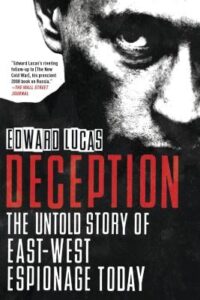 To understand the background to the crisis, Henrikas Bliudzius recommends several books, including Serhii Plokhy’s The Gates of Europe, Andrew Wilson’s The Ukrainians: Unexpected Nation, Borderland by Anna Reid and Applebaum’s Red Famine. Edward Lucas’s Deception and The New Cold War now read like pure prophecy.
To understand the background to the crisis, Henrikas Bliudzius recommends several books, including Serhii Plokhy’s The Gates of Europe, Andrew Wilson’s The Ukrainians: Unexpected Nation, Borderland by Anna Reid and Applebaum’s Red Famine. Edward Lucas’s Deception and The New Cold War now read like pure prophecy.
But at this moment in history, something unusual is happening there, adds Applebaum. Among those 40 million [Ukrainian citizens], a significant number—at all levels of society, all across the country, in every field of endeavor—aspire to create a fairer, freer, more prosperous country than any they have inhabited in the past. Among them are people willing to dedicate their lives to fighting corruption, to deepening democracy, to remain sovereign and free. Some of those people are willing to die for these ideas.
The clash that is coming will matter to all of us, in ways that we can’t yet fathom. In the centuries-long struggle between autocracy and democracy, between dictatorship and freedom, Ukraine is now the front line—and our front line too, she concludes. RTWT
The Russian people don’t want the Kremlin’s war! They can’t arrest them all. https://t.co/wuPQBNBZNP
— Kathryn Stoner (@kath_stoner) February 24, 2022







